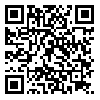Tue, Jul 8, 2025
| فارسی
Volume 29, Issue 1 (Spring 2023)
IJPCP 2023, 29(1): 32-47 |
Back to browse issues page
Download citation:
BibTeX | RIS | EndNote | Medlars | ProCite | Reference Manager | RefWorks
Send citation to:



BibTeX | RIS | EndNote | Medlars | ProCite | Reference Manager | RefWorks
Send citation to:
Heydarpour S, Mehdizadeh Fanid L, Mirza Asgari Z, Heysieattalab S. Effects of Repeated Trans Cranial Magnetic Stimulation on Cognitive Functions of Policemen With Post-traumatic Stress Disorder. IJPCP 2023; 29 (1) :32-47
URL: http://ijpcp.iums.ac.ir/article-1-3852-en.html
URL: http://ijpcp.iums.ac.ir/article-1-3852-en.html
1- Department of Cognitive Neuroscience, Faculty of Educational Sciences and Psychology, University of Tabriz, Tabriz, Iran.
2- Department of Cognitive Neuroscience, Faculty of Educational Sciences and Psychology, University of Tabriz, Tabriz, Iran. ,lfanid@yahoo.co.uk
3- Department of Neurology, School of Medicine, Iran University of Medical Sciences, Tehran, Iran.
2- Department of Cognitive Neuroscience, Faculty of Educational Sciences and Psychology, University of Tabriz, Tabriz, Iran. ,
3- Department of Neurology, School of Medicine, Iran University of Medical Sciences, Tehran, Iran.
Abstract: (1928 Views)
Objectives The present study aims to investigate the effects of repeated transcranial magnetic stimulation (rTMS) on the cognitive functioning of policemen with post-traumatic stress disorder (PTSD).
Methods This is a quasi-experimental study with a pre-test/post-test design. The study population included all male police officers referred to the neuropsychiatric department of Imam Sajjad Hospital in Tehran, Iran, in 2022. Of these, 30 policemen diagnosed with PTSD were selected using a convenience sampling method and randomly divided into two groups of control and intervention. Their PTSD was diagnosed using a diagnostic interview by a psychiatrist and an expert clinical psychologist. Cognitive functions were evaluated using Rey’s visual memory test (VMT), Rey’s auditory-verbal learning test (AVLT), Tower of London test (TLT), Stroop test, and Wisconsin card sorting test, which were performed at the pre-test and post-test phases for both groups. The intervention group received 20-Hz rTMS at 10 sessions, including 5 seconds of stimulation and 20 seconds of rest interval between each stimulation (1000 pulses per session). The data were analyzed by multivariate analysis of covariance in SPSS software, version 22.
Results The intervention group showed better scores in the VMT, AVLT, TLT, residual error, number of card designs, interference score, interference time, congruent error, and incongruent error compared to the control group
Conclusion The high-frequency rTMS has a positive effect on the cognitive functions of policemen suffering from PTSD.
Methods This is a quasi-experimental study with a pre-test/post-test design. The study population included all male police officers referred to the neuropsychiatric department of Imam Sajjad Hospital in Tehran, Iran, in 2022. Of these, 30 policemen diagnosed with PTSD were selected using a convenience sampling method and randomly divided into two groups of control and intervention. Their PTSD was diagnosed using a diagnostic interview by a psychiatrist and an expert clinical psychologist. Cognitive functions were evaluated using Rey’s visual memory test (VMT), Rey’s auditory-verbal learning test (AVLT), Tower of London test (TLT), Stroop test, and Wisconsin card sorting test, which were performed at the pre-test and post-test phases for both groups. The intervention group received 20-Hz rTMS at 10 sessions, including 5 seconds of stimulation and 20 seconds of rest interval between each stimulation (1000 pulses per session). The data were analyzed by multivariate analysis of covariance in SPSS software, version 22.
Results The intervention group showed better scores in the VMT, AVLT, TLT, residual error, number of card designs, interference score, interference time, congruent error, and incongruent error compared to the control group
Conclusion The high-frequency rTMS has a positive effect on the cognitive functions of policemen suffering from PTSD.
Keywords: Repeated transcranial Magnetic stimulation, Cognitive functions, Post-traumatic stress disorder
Type of Study: Original Research |
Subject:
Psychiatry and Psychology
Received: 2023/02/7 | Accepted: 2023/03/11 | Published: 2023/04/1
Received: 2023/02/7 | Accepted: 2023/03/11 | Published: 2023/04/1
| Rights and permissions | |
 |
This work is licensed under a Creative Commons Attribution-NonCommercial 4.0 International License. |






